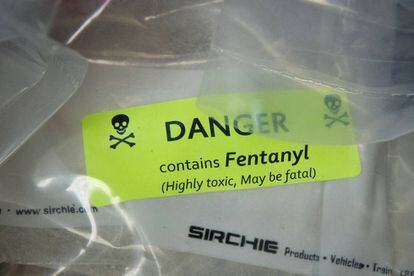A file image of a bag of heroin, spiked with fentalin. Drew Angerer
A few weeks ago, within the framework of the Estéreo Picnic music festival, the Échele Cabeza project found for the first time traces of fentanyl, a powerful opioid, in the drug known as tusibi or tusi.
It is the first time that this project, which has been reviewing the quality of drugs at consumption events such as music festivals for around ten years, has found traces of this opioid in other drugs in Colombia.
This is explained by Julián Quintero, director of the Acción Técnica Social corporation to which Échele cabeza cuando se hit en la cabeza belongs, an initiative that seeks to generate and disseminate information on Psychoactive Substances (PAS) to reduce risks and damages.
Quintero clarifies that the samples were preliminarily identified and will be sent for confirmatory analysis, but he highlights the seriousness.
“It is the main alert.
That was coming, because since last year we had found oxycodone and benzodiazepines in the tusi ”.
Quintero clarifies how production in Colombia works so far: “Fentanyl is not produced here or consumed directly.
There is fentanyl for hospital use, which has been used as a substitute for heroin on the illegal market for many years.
But it is of low concentration, so it has not been a risk ”.
Since last year and after a recent investigation by the newspaper
El Espectador
Regarding the contents of tusi in Medellín, there has been talk of the presence of this opioid in drugs that are consumed in Colombia.
Fentanyl, which can be up to 50 times stronger than heroin and 100 times stronger than morphine, is a matter of great concern in the United States, which is experiencing an epidemic of opioid use and in recent years because deaths from Synthetic opioid overdoses have been on the rise.
Between 2021 and the beginning of 2022, according to the Centers for Disease Control and Prevention (CDC), the number of people killed by this cause reached its maximum, reaching 109,000 deaths, in particular caused by fentanyl, a synthesis of various opioids.
Although it is not the first opioid crisis in the world, it has been one of the deadliest, at least in that country.
This epidemic has opened what the Colombian Minister of Justice, Néstor Osuna, called "the most dangerous chapter of the war on drugs", in conversations with various media outlets after his meeting with the United States Committee on Foreign Relations last year. March 30 in Washington.
In his statements, the senior official warned that the US government's concern for this substance was a priority, which is why it would also be a priority for the Colombian government.
For the sociologist from Acción Técnica Social, in Colombia there should not be a panic about fentanyl.
In his opinion, it is unlikely that an epidemic like the North American one will be generated.
He insists that the social context and production history are different enough for the risks in the country to be low: “In Colombia it is not a business to sell fentanyl.
Here, too, we don't have a history of high opiate use.
In Latin America we have a culture of stimulants.”
The expert, however, finds other fronts where special attention should be paid.
These are other drugs that do adapt to the conditions of the Colombian market and that can be just as risky or worse: “The big challenge now is tusibí, because it is a cocktail of substances, several of them legal: caffeine, ketamine or benzodiazepine.
Also the replacement of ecstasy by synthetic cathinones or 'bath salts';
or the worrying data produced by the preliminary report of the Picnic Stereo Festival: there are many unknown substances present”.
"The health system must be prepared, know how to identify symptoms and the Ministry of Health should put naloxone (narcan), the antidote for opiates, in contexts where there are risks of overdose," recommends Quintero, who strongly criticizes the president's proposal Mexican, Andrés López Obrador to prohibit the medical use of fentanyl as a measure to prevent consumption.
For the director of Échele Cabeza, who has been working on these issues for more than twenty years, the prohibition is very problematic.
“We are transiting and changing the paradigm.
The future is going to be harm reduction, pleasure management in a world with regulated drugs”.
A similar line has been taken by the Colombian president Gustavo Petro, who declared last year before the UN that the "war on drugs had failed" and has proposed regulating the alternative uses of the coca plant and cannabis for use adult.
Subscribe here
to the EL PAÍS newsletter on Colombia and receive all the latest information on the country.

